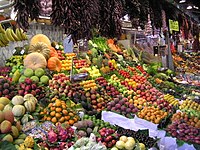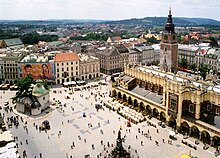Market place


A marketplace is the space, actual, virtual or metaphorical, in which a market operates. The term is also used in a trademark law context to denote the actual consumer environment, i.e. the 'real world' in which products and services are provided and consumed.
Marketplaces and street markets
A marketplace is a location where goods and services are exchanged. The traditional market square is a city square where traders set up stalls and buyers browse the merchandise. This kind of market is ancient, and countless such markets are still in operation around the whole world.
- In North America such markets fell out of favor, but renewed interest in local food has caused the reinvention of this type of market, called farmers' markets, in many towns and cities. Toronto's St. Lawrence Market was recently voted by National Geographic to be the best in the world.
- In Europe, especially in France and Britain, street markets, as well as "marketplaces" (covered places where merchants have stalls, but not entire stores) are commonplace. Both resellers and producers sell their wares to the public.
- In Australia, the largest "open air" market is the Queen Victoria Market - at seven hectares (17 acres), in Melbourne, which is also the largest in the Southern Hemisphere.
- Marketplaces are very important throughout Africa. The largest market in the continent is thought to be the Addis Mercato in Addis Ababa, Ethiopia. The largest market in West Africa is reputed to be Kejetia, Kumasi, Ghana.
- Markets are often temporary, with stalls only present for one or two days a week ("market days"), however some (such as Camden Market in London, UK) are open every day of the week. Such markets are normally specialist—the various stalls of Camden Market, along with the shops associated with it, sell a variety of alternative lifestyle products ranging from clothes and jewellery to CDs, instruments and furniture. An example of a large market is Chatuchak weekend market in Bangkok.
- Some large markets have become permanent institutions comparable to shopping malls. One example is the huge Seventh-Kilometer Market near Odessa, Ukraine.
- Other markets have sprung up suddenly at workplaces. The items sold at 'workplace markets' can be completely random.
The Roman term for market, still in use in a related sense, is forum. The modern shopping mall can be seen as an extension of this concept.
Wholesale markets
Wholesale marketing can take place at a market which primarily sells to traders such as caterers and small shopkeepers, rather than to members of the public, although members of the public are not necessarily excluded. London, England has several centuries old wholesale markets such as Smithfield Market and Billingsgate Fish Market.
See also


- Agricultural Marketing
- Bazaar
- Category:Market houses
- Fish market
- Flea market
- health insurance marketplace
- Landa bazaar
- Market house
- Marketspace
- Market square
- Market town
- Mercado
- Public market
- Roman Forum
- Souq
- Street market
- Freelance marketplace
- Public exchange
